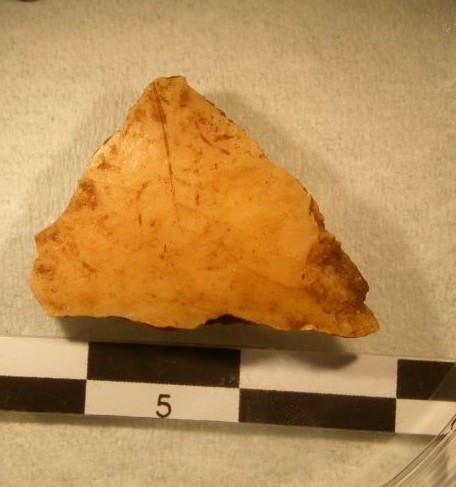
A new study examines the early migration of humans to Europe, focusing on a study of 36,000-year-old skull fragments from Crimea. These findings connect these early settlers to the Gravettian culture, demonstrating their significant role in shaping early European civilization.
Before the permanent settlement of modern humans in Europe, other human populations migrated from Africa to Europe around 60,000 years ago. However, they did not establish long-term settlements. Around 40,000 years ago, a significant climate crisis, along with a super-eruption from the Phlegraean Fields volcanic region near present-day Naples, led to a decrease in the early European populations.

Skull fragment found at Buran Kaya III in Crimea, belonging to an individual dating back to approximately 37,000 years ago. Credit: Eva-Maria Geigl/IJM/CNRS
Discovering Europe’s First Modern Human Settlers
To determine who the first modern humans to settle definitively in Europe were, a team led by CNRS scientists analyzed the genome of two skull fragments from the Buran Kaya III site in Crimea dating to 36,000 and 37,000 years ago. By comparing them to DNA sequences from human genome databases, they revealed the genetic proximity between these individuals and both current and ancient Europeans, especially those associated with the Gravettian culture, known for producing female figurines referred to as “Venuses”, whose apogee in Europe came between 31,000 and 23,000 years ago.
Connection to Gravettian Culture
The stone tools found at Buran Kaya III also resemble some Gravettian assemblages. The individuals studied here therefore contributed both genetically and technologically to the population that gave rise to this civilisation around 5,000 years later. This research, which was published in Nature Ecology & Evolution on 23 October, documents the first arrival of the ancestors of Europeans.
Reference: “Genome sequences of 36,000- to 37,000-year-old modern humans at Buran-Kaya III in Crimea” by E. Andrew Bennett, Oğuzhan Parasayan, Sandrine Prat, Stéphane Péan, Laurent Crépin, Alexandr Yanevich, Thierry Grange and Eva-Maria Geigl, 23 October 2023, Nature Ecology & Evolution.
DOI: 10.1038/s41559-023-02211-9









Surprise, surprise! No comments claiming that the Earth is only 4,000 years old.
Horse apples!
“Archeological Warfare”! They found bones in Greece going back 40,000 years (non african). Archeological warfare is when they implant assumptions and run story pieces, write books, next thing you know such fallacy are taught in classrooms. You don’t know if it was a slave, small tribe, nothing. A piece of a skull? Not a full body? Hmmm? ” Communist Herbert Marcuse Social Justice Science” on display. Get the book “The Last 2 Million Years.”
The last two million years, circa 1973, by READERS DIGEST
is that what you call a real source?
Best get your kiddie Bible and be satisfied with that!
Actually, it’s 5,784 years old.
This appears to be a study trying to prove a point rather than a study trying to find out.
Khmer or Cambodian a must be a first human landed on earth ?
Lame comments here
Not one comment questioning the paper has a shred of evidence
Claims of ‘non-African’ 40 k bones in Greece a complete distortion- cite one peer reviewed study!
We are all out of Africa- there were multiple migrations, mixing of closely related groups, but only a tin hat white supremacist clings to the idea of ‘whites’ as special and not a couple offshoots with poignant gene mutations!